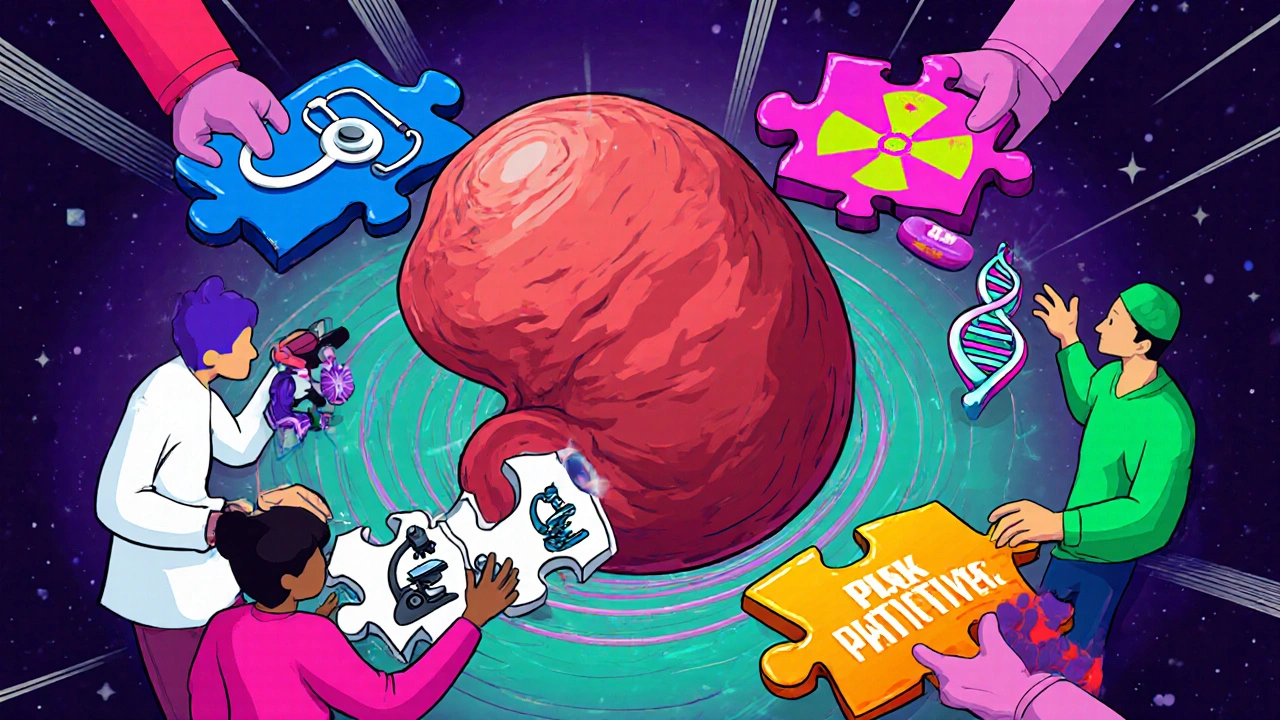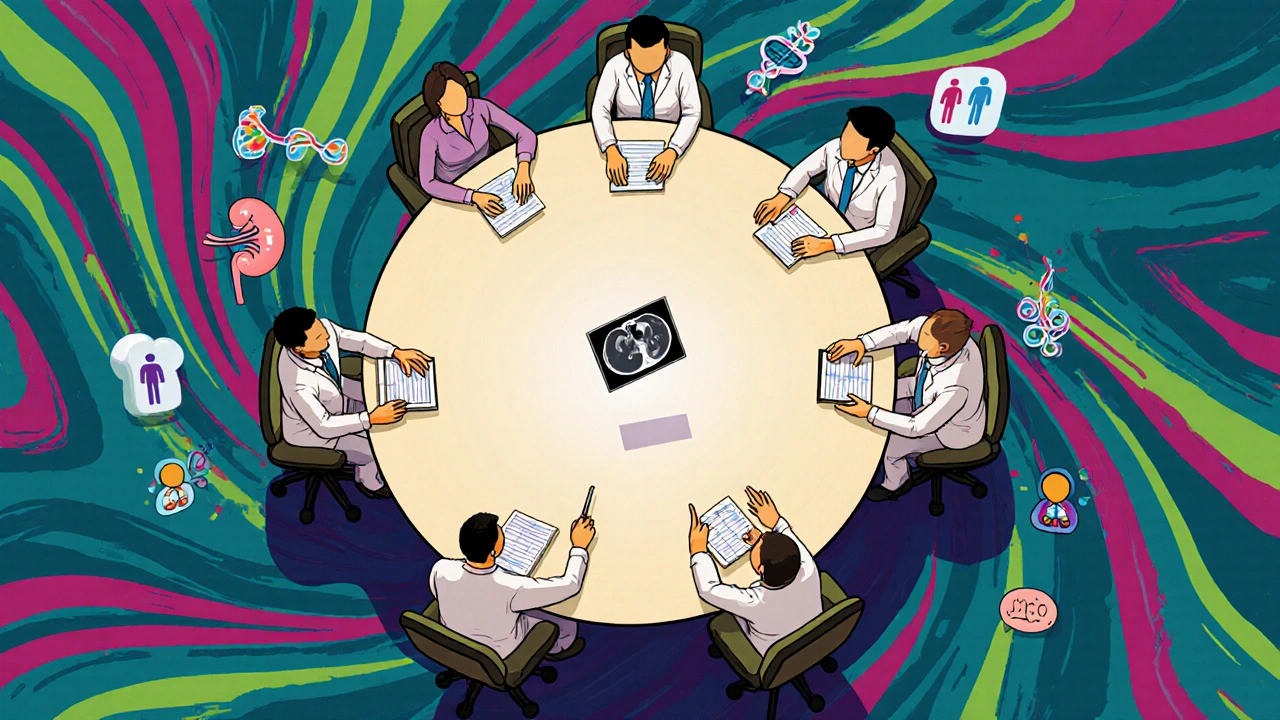Why Multidisciplinary Care Is Critical for Advanced Renal Cell Carcinoma

Multidisciplinary Care Checklist for Advanced RCC
Assess Your Care Team's Approach
This checklist helps you evaluate whether your care team includes the key elements of multidisciplinary care for advanced renal cell carcinoma, based on current clinical standards. Check each item that applies to your situation to determine if you're receiving comprehensive, team-based care.
Key Elements to Check
Check all items that apply to your care team
Your Multidisciplinary Care Score
Results will appear here
When a patient receives a diagnosis of advanced renal cell carcinoma (RCC), the treatment journey suddenly becomes a complex puzzle. One piece alone rarely solves it - you need a whole team working together. That’s why a multidisciplinary care model has moved from a nice‑to‑have idea to a must‑have standard in modern oncology.
What is Advanced Renal Cell Carcinoma?
Advanced Renal Cell Carcinoma is a stage III or IV kidney cancer that has spread beyond the kidney to distant organs or major blood vessels. It accounts for about 2-3% of all adult cancers worldwide and, according to the International Agency for Research on Cancer, roughly 400,000 new cases are diagnosed each year. Once the disease moves beyond the kidney, single‑modality treatment rarely yields durable control, and survival rates drop sharply.
Defining Multidisciplinary Care
Multidisciplinary Care is an organized approach where specialists from different fields collaborate on a single patient’s treatment plan. In the context of advanced RCC, the core team usually includes medical oncologists, nephrologists, radiologists, pathologists, surgical oncologists, and supportive‑care professionals. The goal is to fuse expertise so that each therapeutic decision reflects the full spectrum of diagnostic, therapeutic, and quality‑of‑life considerations.
Why One‑Specialist Care Falls Short
Imagine trying to win a chess match with only the rook. You might capture a few pieces, but you’ll miss many strategic moves. A single‑specialist model works for early‑stage tumors, where surgery alone often suffices. In advanced RCC, however, tumors can be heterogeneous, some lesions respond to immunotherapy while others need targeted agents. Without input from a radiologist, a surgeon might miss a tiny lung nodule; without a pathologist, the molecular profile that guides targeted therapy could be overlooked.
Key Benefits of a Multidisciplinary Approach
- Comprehensive Diagnosis: Radiologists and pathologists combine imaging and biopsy data to create a precise molecular roadmap.
- Tailored Treatment Sequences: Oncologists can sequence immunotherapy, targeted therapy, and surgery in the order that maximizes response and minimizes toxicity.
- Clinical Trial Access: Multidisciplinary tumor boards stay aware of ongoing trials, giving patients a chance to receive cutting‑edge agents.
- Improved Survival: Real‑world data from the National Cancer Database (2023) show a 12‑month median overall‑survival advantage for patients treated in multidisciplinary centers versus single‑specialist clinics.
- Supportive Care Integration: Early involvement of palliative‑care physicians and patient‑navigation services reduces emergency department visits by 27%.

How a Multidisciplinary Team Works in Practice
Most high‑volume cancer centers run weekly tumor‑board meetings. Here’s a typical flow:
- Case Presentation: The referring nephrologist shares the patient’s history, lab results, and imaging studies.
- Imaging Review: A radiologist highlights disease spread, notes any atypical lesions, and recommends further scans if needed.
- Pathology Deep‑Dive: A pathologist explains the tumor’s histology, Fuhrman grade, and molecular alterations (e.g., VHL, MET).
- Therapeutic Planning: Medical oncologists propose systemic regimens-perhaps an immune checkpoint inhibitor plus a VEGF‑targeted agent-while surgical oncologists discuss the feasibility of cytoreductive nephrectomy.
- Supportive‑Care Check: Palliative‑care and patient‑navigation staff raise quality‑of‑life concerns, medication management, and logistics for travel to the center.
- Consensus Decision: The team finalizes a personalized plan, documents it, and assigns follow‑up responsibilities.
This transparent, collaborative loop reduces errors, shortens time to treatment initiation, and ensures the patient’s voice remains central.
Comparing Team‑Based vs Single‑Specialist Care
| Aspect | Multidisciplinary Team | Single‑Specialist Model |
|---|---|---|
| Diagnosis Accuracy | High - combined imaging, pathology, and molecular profiling | Moderate - limited to specialist’s expertise |
| Treatment Personalization | Custom sequences integrating surgery, immunotherapy, targeted therapy | Standard protocols, fewer adjustments |
| Clinical‑Trial Enrollment | Frequent - tumor board alerts on eligible studies | Rare - limited awareness |
| Overall Survival Benefit | +12‑month median (2023 NCDB data) | Baseline |
| Patient‑Reported Quality of Life | Higher - early palliative‑care integration | Variable |
Common Pitfalls and How to Avoid Them
- Fragmented Communication: Use shared electronic health‑record notes and a designated case coordinator to keep everyone on the same page.
- Delays in Imaging Review: Implement rapid‑turnaround protocols for CT/PET scans, aiming for a 48‑hour read.
- Overlooking Molecular Testing: Make molecular profiling a mandatory step before finalizing systemic therapy.
- Neglecting Patient Preferences: Include a patient‑advocate or navigator in the tumor board to voice concerns and goals.

Pro Tips for Building an Effective Multidisciplinary Program
- Define Clear Roles: Write an SOP that outlines who leads the discussion, who documents the plan, and who follows up.
- Schedule Regular Meetings: Weekly or bi‑weekly slots prevent backlog and keep cases fresh.
- Leverage Tele‑medicine: For community oncologists, virtual tumor boards expand expertise without travel.
- Track Outcomes: Use a registry to capture survival, response rates, and quality‑of‑life metrics; feed data back into the program.
- Educate the Team: Quarterly CME sessions on emerging RCC therapies (e.g., HIF‑2α inhibitors) keep everyone current.
Future Directions: Precision‑Centric Multidisciplinary Care
By 2026, AI‑driven decision‑support tools are expected to sift through genomic, radiomic, and clinical data in real time, suggesting optimal therapy combos for each patient. When these tools are embedded in multidisciplinary tumor boards, the human‑machine partnership could push median overall survival beyond 48 months for select advanced RCC cohorts.
Take‑Away Checklist
- Confirm molecular profiling (VHL, MET, etc.) early.
- Schedule a multidisciplinary tumor board within two weeks of diagnosis.
- Ask the team about relevant clinical trials before finalizing systemic therapy.
- Integrate palliative‑care and patient‑navigation from day one.
- Document outcomes and adjust the program regularly.
Frequently Asked Questions
What does a multidisciplinary team usually consist of for advanced RCC?
A typical team includes a medical oncologist, nephrologist, radiologist, pathologist, surgical oncologist, palliative‑care physician, and a patient‑navigator. Some centres also add a genetic counselor and a clinical‑trial coordinator.
How soon should a tumor board meet after an advanced RCC diagnosis?
Ideally within 10-14 days. Rapid review prevents treatment delays and allows timely enrollment in clinical trials.
Does multidisciplinary care improve survival?
Yes. Analysis of the 2023 National Cancer Database showed a median overall‑survival gain of about 12 months for patients managed in multidisciplinary centers compared with single‑specialist care.
Are there any downsides to a multidisciplinary approach?
The main challenges are logistical - coordinating schedules, ensuring clear communication, and managing increased administrative workload. These can be mitigated with dedicated case managers and shared digital platforms.
How can patients advocate for multidisciplinary care?
Ask your primary doctor whether a tumor board will review your case, request referrals to a renal‑cancer specialist, and inquire about available clinical trials. A patient‑navigator can also help coordinate appointments.
Nis Hansen
October 17, 2025 AT 21:25Advanced renal cell carcinoma is not just a medical puzzle; it's an ethical crossroads where science meets humanity.
The when a tumor spreads beyond the kidney, the traditional hero‑doctor narrative collapses, demanding a chorus of expertise.
The multidisciplinary tumor board becomes a modern agora, where oncologists, radiologists, pathologists, and surgeons debate the fate of a single life.
This collective deliberation mirrors the philosophical concept of the ‘wisdom of crowds’, where diverse perspectives reduce individual blind spots.
Each specialty brings a unique epistemic lens: the radiologist maps invisible terrain, the pathologist decodes molecular hieroglyphs, and the surgeon visualizes anatomical possibilities.
By integrating these lenses, clinicians can sculpt a treatment roadmap that aligns with both tumor biology and patient values.
The data from the 2023 NCDB, showing a twelve‑month survival gain, is a statistical echo of this synergy.
Moreover, the presence of palliative‑care physicians early in the process reframes success from mere survival to quality of lived days.
Real‑world experience tells us that patients who feel heard by a team report lower anxiety and higher adherence to therapy.
Incorporating clinical‑trial opportunities into the board’s agenda turns every patient into a potential pioneer, accelerating translational research.
Tele‑medicine has broadened access, allowing community oncologists to tap into academic expertise without the burden of travel.
Standardizing electronic health‑record notes ensures that no insight evaporates between meetings, fostering accountability.
The ultimate goal is not just prolonging life but enriching it with informed choice and compassionate support.
Future AI decision‑support tools will amplify this process, parsing genomics and radiomics in seconds.
Yet, the human element-dialogue, empathy, and shared decision-will remain the cornerstone of multidisciplinary care.
In sum, the multidisciplinary model transforms a fragmented battle into a coordinated symphony, offering patients a fighting chance against advanced RCC.
Fabian Märkl
October 31, 2025 AT 17:45I've seen multidisciplinary tumor boards turn a chaotic treatment plan into a clear roadmap 😊.
When the radiology, pathology, and oncology teams sync up, patients get faster access to the right therapy.
The added perspective also uncovers trial options that might otherwise be missed.
It's truly a win‑win for both clinicians and patients 🚀.
Natala Storczyk
November 14, 2025 AT 15:05WHAT A STUNNING CLAIM!!! WITHOUT A TEAM, YOU'D BE LOST IN A MAZE OF CONFUSION!! THE DATA DOESN'T LIE-SURVIVAL SKYROCKETS WITH COLLABORATION!!!
Avril Harrison
November 28, 2025 AT 12:25Across the pond, we've watched similar multidisciplinary models blossom in NHS cancer hubs, and the patient feedback has been overwhelmingly positive.
The relaxed yet thorough vibe in those meetings reminds me of a good tea break-every specialist gets a moment to sip insights before diving back in.
It's a great reminder that care can be both rigorous and human.
nitish sharma
December 12, 2025 AT 09:45It is imperative that each specialist adheres to a predefined protocol, thereby ensuring accountability and precision in patient management.
By documenting every decision within a shared digital platform, the team mitigates the risk of miscommunication.
Such rigor not only enhances therapeutic outcomes but also upholds the highest standards of medical ethics.
I commend institutions that have institutionalized these practices.
Lyle Mills
December 26, 2025 AT 07:05Shared notes keep the whole team on the same page.
Nhasala Joshi
January 9, 2026 AT 04:25While you champion digital logs, one must wonder who holds the key to that data-big pharma or the shadowy AI vendors lurking behind the scenes 🤔.
The very algorithms that prioritize trial enrollment could be calibrated to funnel patients into proprietary pipelines, a classic case of data commodification.
Nonetheless, leveraging such platforms can accelerate precision oncology, provided we remain vigilant about bias and consent 📊.
Barbara Grzegorzewska
January 23, 2026 AT 01:45Honestly, the whole multidisciplinary shindig sounds like a fancy circus, but with real science juggling tumor chips instead of clowns 😊.
It's a bit overhyped sometimes, but you can't deny the sparkle when a surgeon, a radioloist, and an onko team finally click.
Still, stay wary of the buzzword bingo that every admin loves to throw around.
Rohit Sridhar
February 5, 2026 AT 23:05Totally get that vibe-seeing all the experts vibe together can feel like a brilliant jam session!
Keep the energy high, and remember every patient’s story is the rhythm that guides the treatment melody.